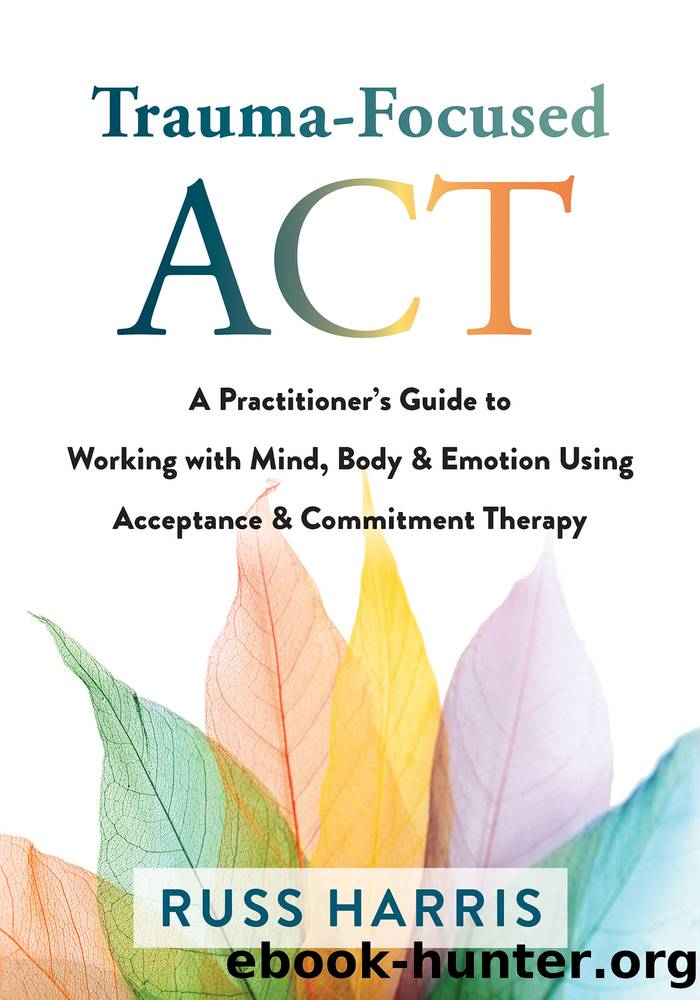Trauma-Focused ACT A Practitionerâs Guide to Working with Mind, Body & Emotion Using Acceptance & Commitment Therapy by Russ Harris

Author:Russ Harris [Harris, Russ]
Language: eng
Format: epub
Published: 2021-10-14T18:55:04+00:00
Motivation
Clients may say, âI have to be tough on myself. Thatâs what stops me from screwing up,â or âThis is how I motivate myself. If I go easy on myself, I wonât get anything done.â We want to validate that in the short term, this can indeed be motivating; but in the long term, it usually has the opposite effect. The well-known Carrot and Stick metaphor is useful here:
The Carrot and Stick Metaphor
Therapist: (playfully) You have a pet donkey, right? Carries your goods to the marketplace?
Client: (playing along) Err, yeah, of course.
Therapist: And there are two ways to motivate that donkey, right? Beat it with a stickâand it carries the load to escape the beating. Or coax it with carrotsâand it carries the load to get more carrots. The more you use carrots, the healthier and happier your donkey. But the more you rely on the stick, the more battered, bruised, and miserable your donkey becomes. So being hard on yourselfâis that carrot or stick?
Client: Yeah, itâs the stick. But then how am I supposed to motivate myself?
Therapist: Well, luckily, we have something much better than carrotsâwe have something called âvalues.â
From here therapy segues into learning self-motivation through values, values-based goals, and compassionate self-encouragement. The Two Coaches metaphor (similar to the Two Friends metaphor) is often useful for perfectionistic clients and others who cling to self-criticism for motivation.
The Two Coaches Metaphor
Therapist: So whatâs your favorite sport? (Client answers.) Okay, so letâs imagine there are two teams of equally talented players, and they each have a coach. The first coach motivates the players through being harsh, judgmental, and critical and focusing on everything the players do wrong: âThat was pathetic!â âYouâre useless!â âYouâre not even trying!â âI canât believe you did that!â âHow many times do I have to tell you?â âYou screwed up this, you messed up that, and you completely loused up the other.â
The second coach motivates the players through kind, supportive feedback and encouragement, acknowledging what they do right as well as what they do wrong: âYou did A, B, and C really well today. And I can see youâre improving at D and E. And I was stoked you remembered to do H and I when J happened. I notice you seem to be struggling a bit with F and G; letâs have a look at whatâs going on there, and see how you can improve on that. Yeah, I know you messed up with X and Y, but heyâweâre all human; we all make mistakes. Donât beat yourself up about it; letâs go over it and see what you can do differently next time something like that happens.â
There are lots of published studies on this topicâand what we know is that harsh, critical, judgmental coaching in the long term leads to demotivated players and poor performance. Kind, supportive coaching is far more effective; players are more motivated and performance is better. Have you ever had a coach/teacher/manager/parent who used the harsh, critical method with you? What was that like for you? Which
Download
This site does not store any files on its server. We only index and link to content provided by other sites. Please contact the content providers to delete copyright contents if any and email us, we'll remove relevant links or contents immediately.
The Art of Thinking Clearly by Rolf Dobelli(10489)
The 5 Love Languages: The Secret to Love That Lasts by Gary Chapman(9815)
Mindhunter: Inside the FBI's Elite Serial Crime Unit by John E. Douglas & Mark Olshaker(9343)
Becoming Supernatural by Dr. Joe Dispenza(8217)
Nudge - Improving Decisions about Health, Wealth, and Happiness by Thaler Sunstein(7707)
The Road Less Traveled by M. Scott Peck(7603)
Mastermind: How to Think Like Sherlock Holmes by Maria Konnikova(7347)
Enlightenment Now: The Case for Reason, Science, Humanism, and Progress by Steven Pinker(7313)
Win Bigly by Scott Adams(7198)
The Way of Zen by Alan W. Watts(6614)
Factfulness: Ten Reasons We're Wrong About the World – and Why Things Are Better Than You Think by Hans Rosling(4742)
The State of Affairs by Esther Perel(4721)
Gerald's Game by Stephen King(4654)
Man's Search for Meaning by Viktor Frankl(4606)
The Confidence Code by Katty Kay(4260)
Thinking in Bets by Annie Duke(4227)
The Healing Self by Deepak Chopra(3580)
Hidden Persuasion: 33 psychological influence techniques in advertising by Marc Andrews & Matthijs van Leeuwen & Rick van Baaren(3565)
The Worm at the Core by Sheldon Solomon(3487)
